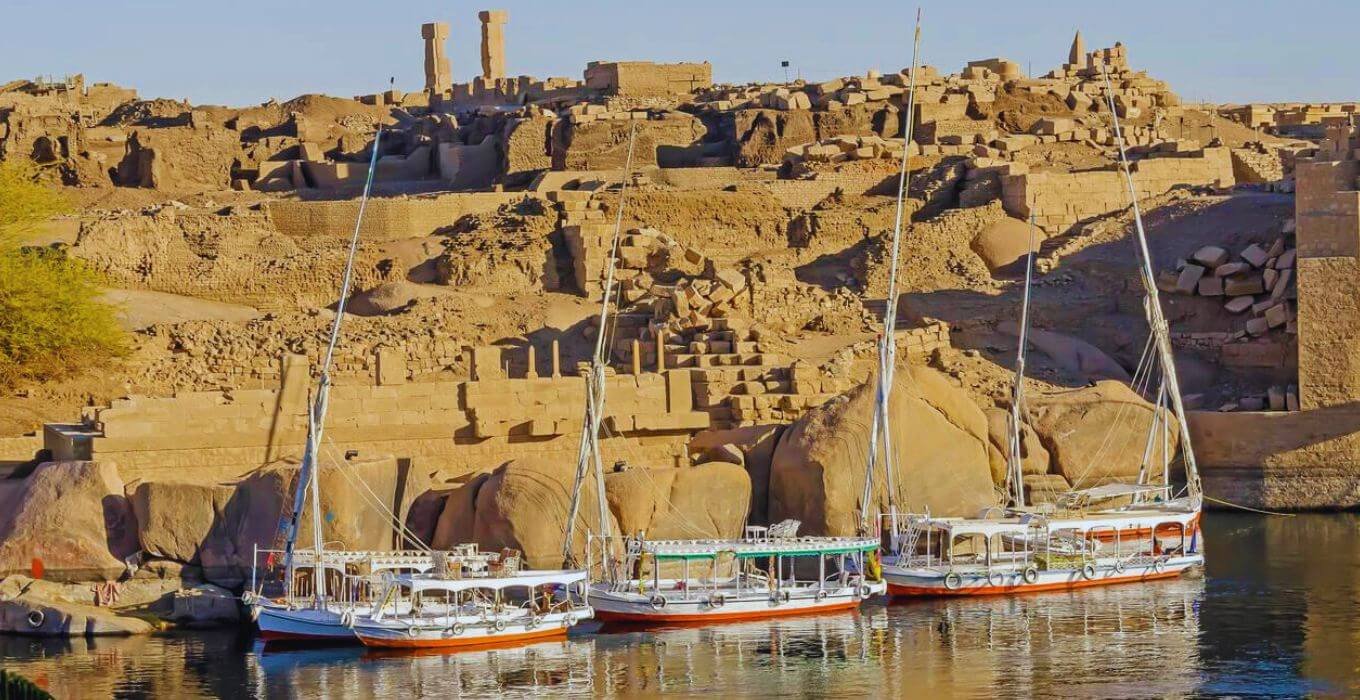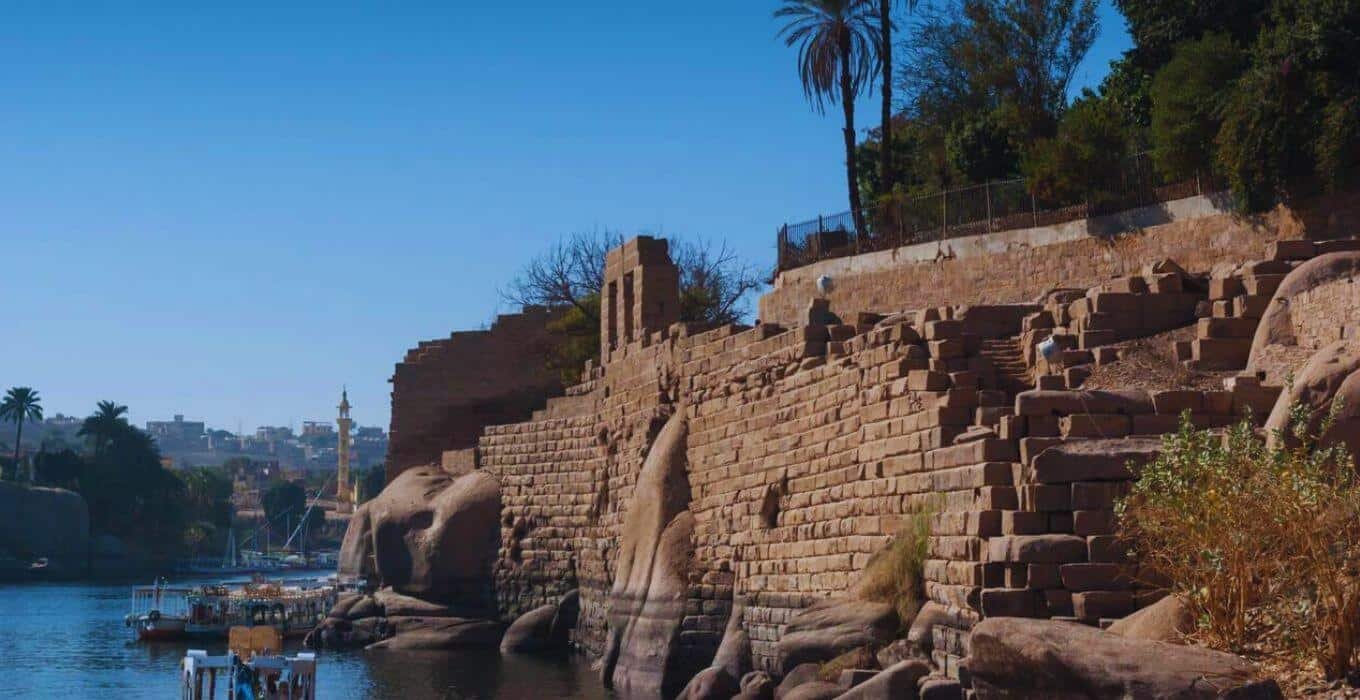When your Nile cruise reaches Aswan, the rhythm of the journey changes. The river feels wider, calmer, and more personal — and right at its heart sits Elephantine Island. This is not a place of towering pylons or overwhelming scale. Instead, Elephantine Island offers something many cruise travellers quietly crave: authentic Nile life layered with deep history, experienced at an unhurried pace.
For guests travelling with Egypt Cruise Planners, Elephantine Island represents the Nile beyond postcards. It’s where ancient border defenses, sacred flood measurements, and modern Nubian homes coexist on the same riverbank. From your cruise deck, you see minarets, palm trees, feluccas drifting past, and granite boulders glowing at sunset — a scene that explains why Aswan has always felt different from anywhere else along the Nile.
This island mattered deeply to ancient Egypt. Positioned at the southern frontier, Elephantine controlled trade routes, protected the kingdom’s border, and monitored the Nile’s life-giving floods. Today, it offers cruise travelers a rare combination: archaeology you can walk through, culture you can still feel, and a quiet atmosphere that balances temple-heavy itineraries.
That’s why Elephantine Island isn’t treated as a filler stop in our Nile cruise planning. It’s included deliberately — to slow the journey, add context, and remind you that the Nile was not only a ceremonial river, but a living one.
Why Elephantine Island Matters on a Nile Cruise
For Nile cruise travelers, not every stop needs to be monumental to be meaningful. Elephantine Island matters because it reveals how the Nile actually worked — not just as a backdrop for temples, but as a living artery of trade, borders, and daily life.
Historically, Elephantine marked Egypt’s southern frontier. It was the last outpost before Nubia, controlling river traffic and trade coming from Africa’s interior. Ivory, gold, granite, and exotic goods all passed through here, which is why the island became both a military checkpoint and an administrative center. For cruise guests, this context adds depth to everything you’ve already seen upstream.
From a cruise-planning perspective, Elephantine plays a different role than grand sites like Philae or Karnak. It offers:
- A slower, walkable experience that balances intensive sightseeing days
- A chance to step directly into a residential Nile island, not a fenced archaeological zone
- A clear understanding of why Aswan was critical to Egypt’s survival, not just its beauty
This is especially valuable on luxury and dahabiya Nile cruises, where the journey itself matters as much as the landmarks. Elephantine allows you to experience the Nile at eye level — watching feluccas pass, hearing local life, and seeing how ancient geography still shapes modern routines.
For Egypt Cruise Planners, Elephantine Island isn’t included to “add another stop.” It’s included because it explains how the Nile connected people, power, and place — something every well-designed Nile cruise should help you understand.
What You’ll See on Elephantine Island

Elephantine Island rewards travellers who enjoy detail, context, and atmosphere rather than scale. The visit unfolds naturally, on foot, with each element explaining a different chapter of the Nile’s story — ancient, scientific, and human.
Ancient Ruins and the Temple of Khnum
Scattered across the island are the remains of temples dedicated to Khnum, the ram-headed creator god believed to control the Nile’s annual flood. Unlike Egypt’s massive temple complexes, these ruins feel approachable and quiet. For cruise guests, this intimacy allows time to understand why the Nile mattered, not just admire its monuments.
The Nilometer – Measuring the Lifeline of Egypt
One of Elephantine’s most important features is its ancient Nilometer. This stone staircase and measuring shaft was used for centuries to monitor water levels, determining:
- Agricultural success
- Taxation levels
- Famine or prosperity
Standing here, many cruise travellers realise how closely Egyptian life depended on precise knowledge of the river — a moment that connects history directly to the landscape you’ve been sailing.
Aswan Museum
Housed in a historic riverside building, the Aswan Museum displays artifacts excavated from Elephantine itself. Tools, statues, inscriptions, and everyday objects help explain the island’s role as both a border city and a trading hub. It’s a compact but highly informative stop that fits perfectly into a cruise schedule.
Living Nubian Neighborhoods
Perhaps the most memorable part of Elephantine Island is that it’s still alive. Nubian families live here today, with brightly painted homes, shaded courtyards, and river-facing paths. This living layer adds something rare to a Nile cruise: cultural continuity, not just preserved history.
For many guests, this blend of ruins and real life is what makes Elephantine Island feel authentic rather than staged.
How Elephantine Island Fits into a Nile Cruise Itinerary
On a well-designed Nile cruise, pacing matters as much as the sites themselves. Elephantine Island fits naturally into the Aswan portion of the journey, offering contrast after temple-focused visits and before the cruise turns north or south again.
Most itineraries include Elephantine Island while the ship is docked in Aswan, typically as:
- A short guided island walk
- A felucca ride across the river with an island stop
- Or a combined visit with the Aswan Museum and Nubian neighborhoods
Because access is by small boat, the experience feels personal and flexible — something larger sites can’t always offer.
From a planning standpoint, Elephantine Island works especially well on:
- 4-night Luxor–Aswan or Aswan–Luxor cruises, where time in Aswan is unhurried
- Luxury Nile cruises, where guests value atmosphere and depth
- Dahabiya Nile cruises, which sail at river level and dock closer to the island
Unlike major monuments that require strict time slots, Elephantine allows guides to adjust the visit based on light, temperature, and guest interest. Early morning and late afternoon are ideal, when the granite rocks warm in color and the island feels at its calmest.
For Egypt Cruise Planners, this flexibility is exactly why Elephantine Island is included. It enhances the cruise rhythm rather than interrupting it — giving travellers space to absorb the Nile instead of rushing past it.
Best Time to Visit Elephantine Island

Because Elephantine Island is an open, walkable island, timing has a noticeable impact on comfort and enjoyment — something we factor carefully into every Nile cruise itinerary.
From October to April, Elephantine Island is at its best. Daytime temperatures are mild, walking between the ruins and Nubian neighborhoods is comfortable, and light conditions are ideal for photography. This is the preferred season for most luxury and deluxe Nile cruises, and when Elephantine feels calm rather than exposed.
During the summer months (May to September), visits are still possible, but timing becomes essential. We schedule Elephantine Island early in the morning or late in the afternoon, avoiding peak heat while preserving the atmosphere. Because the island is small and close to the cruise dock, it remains one of the more manageable Aswan visits even in warmer weather.
Seasonally, Elephantine works well because:
- There is no long-distance transport involved
- Walking distances are short and adjustable
- Breezes from the Nile often cool the island naturally
For cruise travellers, this means Elephantine Island remains a pleasant experience year-round when planned correctly — one that adds depth without adding strain.
Practical Tips for Visiting Elephantine Island on a Nile Cruise
Elephantine Island is relaxed and welcoming, but a few practical details can make the visit noticeably smoother — especially when it’s part of a Nile cruise schedule.
Because the island is explored mostly on foot, comfortable walking shoes are essential. Paths are uneven in places, particularly around the archaeological areas, and some steps near the Nilometer can be worn smooth by centuries of use.
Light, breathable clothing works best year-round. Even in winter, the Aswan sun can be strong, and shade is limited around the ruins. A hat and sunglasses go a long way toward staying comfortable, especially during midday visits.
Elephantine is a living Nubian community, not just an archaeological site. Photography is generally welcome, but it’s courteous to ask before photographing people or private homes. This small gesture is appreciated and often leads to warmer interactions.
If your visit includes time in local areas, carrying small Egyptian Pound notes is useful for minor purchases or polite tips. There’s no pressure to buy, but being prepared avoids awkward moments.
One advantage of visiting Elephantine Island on a cruise is logistics. Boat crossings, timing, and entry are all arranged in advance, allowing you to focus on the experience rather than the details.
For Egypt Cruise Planners, these practical considerations are part of the planning process — ensuring Elephantine Island feels easy, respectful, and unhurried, exactly as it should.
Frequently Asked Questions About Elephantine Island
Is Elephantine Island included in all Nile cruises?
Not all Nile cruises include Elephantine Island, but it is commonly featured in well-planned itineraries that allow sufficient time in Aswan. Deluxe, luxury, and dahabiya cruises are more likely to include it due to their flexible pacing.
How long does a typical visit to Elephantine Island take?
Most visits last 45 to 90 minutes, depending on whether the program includes the Nilometer, Aswan Museum, or time walking through Nubian neighborhoods.
Is Elephantine Island suitable for all ages?
Yes. The island is generally flat and walkable, making it suitable for most travellers. However, there are some uneven surfaces near the ruins, so comfortable footwear is recommended.
Is Elephantine Island crowded like other major sites?
No. Compared to major temples, Elephantine Island is noticeably quieter. Its residential nature and limited group access keep the experience calm and unhurried.
Do we reach Elephantine Island by felucca or motorboat?
Access is typically by small motorboat or traditional felucca, depending on river conditions and itinerary style. Both offer scenic crossings and easy access from the Aswan riverbank.
Can Elephantine Island replace other Aswan attractions?
Elephantine Island doesn’t replace sites like Philae Temple or the High Dam — it complements them. It adds cultural and historical depth rather than monumental scale.
Plan Your Nile Cruise with Egypt Cruise Planners
Elephantine Island is one of those places that only truly works when it’s planned correctly. Timed well, it becomes a calm, insightful pause in your Nile journey — not a rushed add-on. Included without thought, it risks being overlooked. That difference is where experienced cruise planning matters.
At Egypt Cruise Planners, we design Nile cruise itineraries around flow, balance, and understanding, not just landmarks. Elephantine Island fits naturally into that philosophy. It adds cultural depth to Aswan, explains the Nile’s practical role in ancient Egypt, and offers a quieter, more human experience to balance the grandeur of temples and tombs.
Whether you’re considering:
- A standard Nile cruise with classic highlights
- A deluxe or ultra-deluxe cruise with relaxed pacing
- Or a dahabiya Nile cruise that sails close to the riverbank
we ensure Elephantine Island is included only when it enhances your journey.
If you’d like help choosing the right cruise style, sailing season, or itinerary length — or want to understand how sites like Elephantine fit into the bigger picture — our local cruise planners are here to guide you.
Conclusion
Elephantine Island captures something essential about the Nile that grand monuments alone can’t: continuity. It shows how the river shaped borders, belief, science, and daily life—and how that story still unfolds today. For Nile cruise travellers, this island isn’t about ticking off another site; it’s about slowing down and understanding the rhythm of Aswan and the people who live with the river.
Planned thoughtfully, Elephantine Island becomes a calm, meaningful counterpoint to temple visits—an experience that adds context, balance, and authenticity to your cruise. That’s why Egypt Cruise Planners includes it with intention, timing, and care—so your journey along the Nile feels complete, not crowded.
